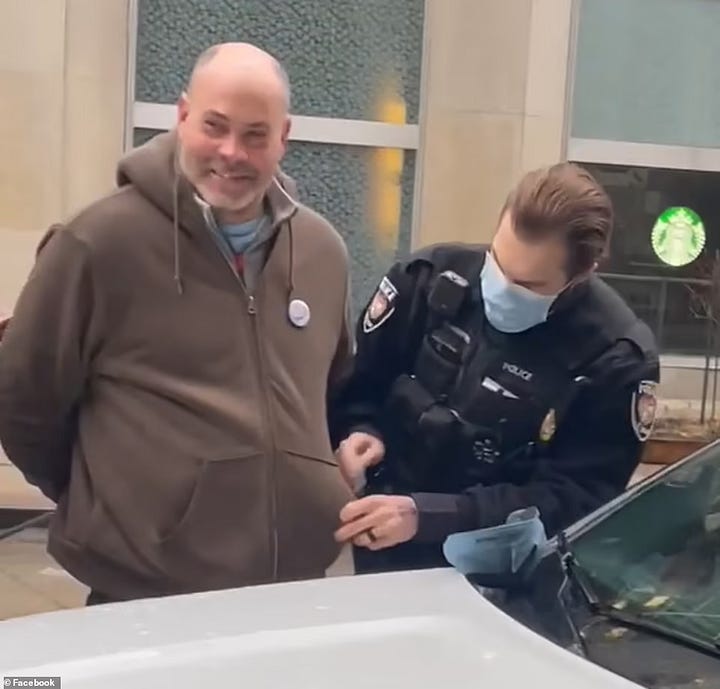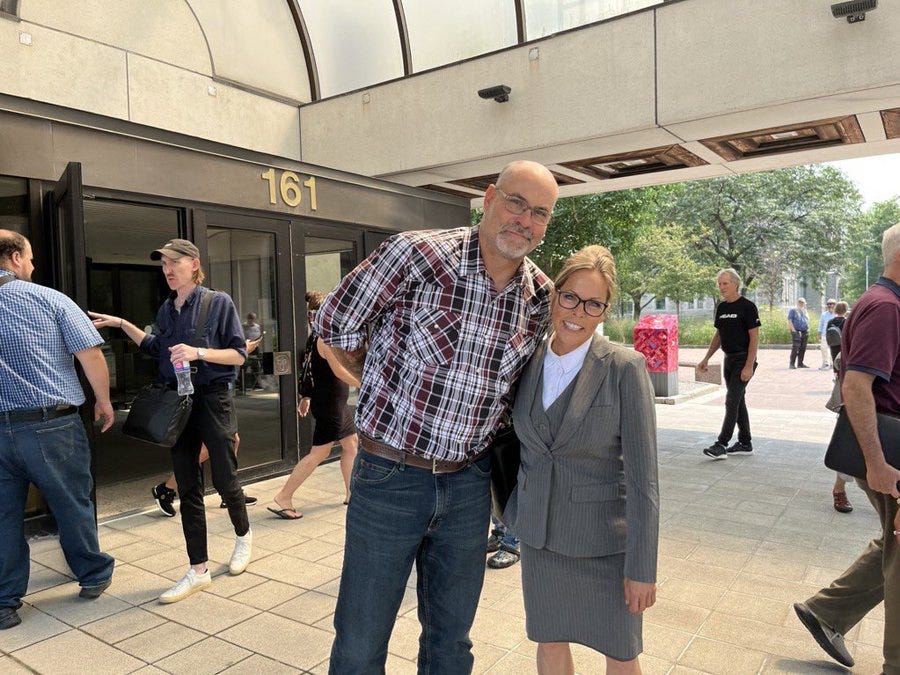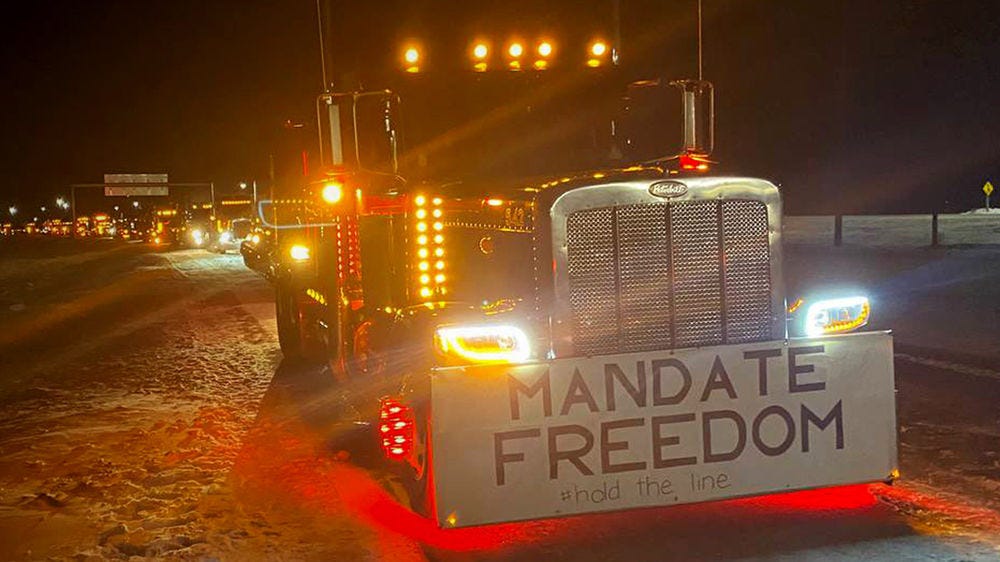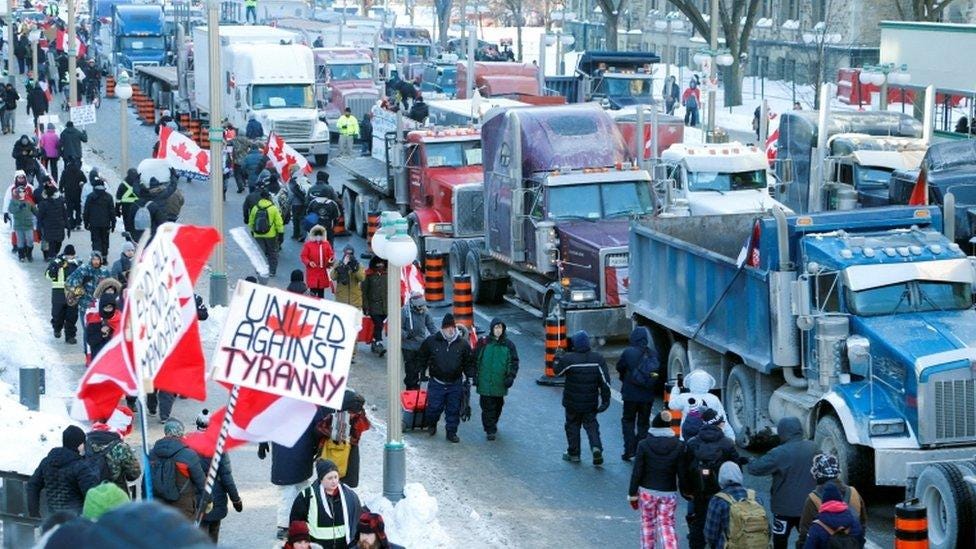Mischief Conviction for Lich and Barber Sends an Unsettling Message to Canadians
Judge's rationale challenges freedom of expression over enjoyment of property
The long awaited verdict was finally delivered in the trial of Tamara Lich and Chris Barber, two key figures of the Freedom Convoy that rolled into Ottawa in the winter of 2022 to protest COVID 19 vaccine mandates imposed by the Trudeau government. But, as the Freedom Convoy travelled the country en route to Ottawa, its message and mission expanded and resonated with, not only millions of Canadians, but the world, as it challenged any and all of the destructive and useless COVID restrictions and mandates governments had imposed on their citizens. The headlights on those semis travelling the highways through the night, symbolized a ray of hope after two years of darkness and despair, for many disheartened souls.
While Lich and Barber both faced an array of charges laid by the Crown as a result of the roles they played in the convoy protest, both were found guilty on just one – mischief. Barber, alone, was found guilty of counselling to disobey a court order (for truckers to cease all honking) by encouraging protesters to lay on their horns to alert others of potential police ‘raid’ after the order was already in place. On all the additional charges of intimidation, and counselling to commit intimidation and obstructing police and counselling to obstruct police they were found not guilty. The counselling to commit mischief charge was stayed by the Crown given that the two had already been convicted on the mischief charge.
Media presence for the verdict was substantially larger than at any other time during the trial.
Justice Heather Perkins-McVey, took some four hours to deliver her verdict to a packed courtroom of which appeared to be primarily made up of media and supporters of the two defendants. The verdict comes some three years after both Lich and Barber were arrested following the government’s invocation of the Emergencies Act (since declared illegal by a Federal Court), that sent riot police into the demonstration to pepper spray, beat, assault and arrest peaceful protesters, many of whom have also either been convicted of various charges, like Lich and Barber, or still face charges in the courts.
Some may believe the pair got off easy, given the number of charges they faced. Yet, at the heart of this trial and all other Freedom Convoy trials – and in this I include the trials related to the protest in Coutts, Alberta – is the question of whether the right to peacefully protest and freedom of speech and expression in Canada truly still exists.
This basic and fundamental right was the primary focus of Lawrence Greenspon’s closing argument in defense of his client Lich, as well as Barber. In that argument, he asserted that, in a contest between the constitutionally and charter protected rights of Canadians to freedom of expression and peaceful assembly, versus the right to enjoyment of property, there is no contest – freedom of expression must take precedence every time. To reinforce this point, Greenspon underscored the fact that the ‘enjoyment of property’ is not even mentioned in the Constitution or the Charter.
He also referenced the two court orders issued by Ontario Superior Court Justice Hugh MacLean during the convoy’s stay in Ottawa related to halting the honking of horns. MacLean had clearly stated in both orders that as long as the protesters complied with the terms of the orders: “They remain at liberty to engage in a peaceful, lawful and safe protest.” “Any court,” said Greenspon, “would be hard-pressed to find another case where a higher court has expressed the reason why freedom of expression should prevail over enjoyment of property.” He also cited a decision from an Ontario Court of Appeal case, wherein an appellant’s conviction was overturned and an acquittal granted on the basis of freedom of speech, superseding ‘enjoyment or use’ of property (R. v. Tremblay).
Yet, it appears Judge Perkins-McVey did not agree with this defense. Instead she to challenged Greenspon’s contention that freedom of expression trumps the enjoyment of property every time – seeming to set aside his assertion that property rights are not at all mentioned in the Constitution or the Charter. She essentially said that the Charter’s right to freedom of expression does not remove the need for ‘common sense’ when it comes to the matter of competing rights — that being the right to freedom of expression versus the right to the enjoyment of property. She also pointed to the portion of the Charter that states: “Charter rights are not absolute.” In leading her to the verdict she said she read the book, ‘The Right to Protest: an Uneasy Balance’ and pondered, “When does the right to protest protect those from criminal liability or allow them to infringe on the right of other citizens to enjoy their property?”
She also challenged Greenspon’s use of the two court orders issued by Justice MacLean, during the protest, to end the honking of horns to support his argument. Greenspan maintained those orders clearly expressed why freedom of expression should prevail over enjoyment of property. Yet, Perkins-McVey contended that MacLean’s orders dealt only with the honking of horns, and that in his order he clearly stated that he was asked to address the horns and only the horns. She said that he did not deal with any of the other matters related to property rights or any facts related to the continual effects the presence of the convoy in the downtown area had on the its residents, the public and businesses, as he was not petitioned to address those factors.
In that regard, it would seem that Perkins-McVey relied on the testimonies of the eight witnesses who took the stand during the trial to tell the court how the convoy and the protesters had negatively impacted various aspects of their lives — their ability to work, their ability to get to work, their sense of security and even their sense of ‘safety’. It should be noted that the defense had petitioned to disallow their testifying, but the judge overruled it. The defense had maintained that it could just as easily provide an equal number of witnesses to attest to the fact that the convoy was a positive presence, but chose not do to so.
Aside from the question of which right supersedes which in terms of enjoyment of property versus freedom of expression, the judge outlined many other factors that led to her verdict. The document, in its entirety, is 105 pages long and reviews many elements of the Freedom Convoy’s presence in Ottawa. This includes how the Ottawa Police Service and other elements of the city government dealt with it, and how Lich and Barber communicated and interfaced with them. Yet she made no mention of how the Federal government ‘dealt' with the Convoy. How it unfairly and dishonestly slandered Convoy protesters calling them racists, extremists, terrorists and even Nazis — which may have had an impact on how people in Ottawa viewed the convoy.
In finding Lich and Barber guilty of mischief, Perkins-McVey made reference to what she viewed as their words as well as their actions. In her view there was no doubt that the pair’s statements in telling people to stay strong, to hold the line*, to stay united and not to give into fear were meant to incite their followers to continue doing what they were doing or to come to Ottawa and continue the protest and to continue to disrupt the downtown. She concluded that the evidence “strongly” demonstrated that Lich and Barber displayed a sense of unity with the protesters and encouraged them to block roads, which she said interfered with Ottawa residents’ lawful use of property.
*While Perkins-McVey, mentioned Lich's signature slogan ‘Hold the Line’ a number of times and agreed it was a rallying cry, she also indicated that it could have many meanings and, as such, its use was not something that really factored heavily in her decision making.
In her view the evidence presented by the Crown proved that Barber was not a “mere bystander” in the protest, as he had encouraged protesters to block intersections and therefore committed mischief. She cited quotes from some of his TikTok videos, such as the protesters having “train-wrecked” city or his noting online that an intersection in front of the National Gallery was “looking lonely and someone should fix it,” as evidence of this.
The judge mentioned a number of times how Lich was, ‘The spark that lit the fire’. In doing so she said it was clear that Lich also had a leadership role as she was seen in many videos standing ‘shoulder to shoulder’ with protesters and encouraging them to continue to protest. In that regard she said, “Ms. Lich could not have failed to have been aware that the actions of the Freedom Convoy was having and continuing the distress of residents of downtown, interfering with their right of lawful access, and use of public property.”
In making her remarks about Lich, she also referenced her fundraising efforts indicating that her continued fundraising was also evidence of her guilt in providing the means for the protest to continue in Ottawa, despite the ‘impacts’ it was having on people (and the public property they wished to enjoy).
Yet, both of the major fundraising platforms that were used by the Freedom Convoy were shut down while it was in Ottawa. GoFundMe was shut down on February 3, based on false allegations of violence against the convoy and the funds on GiveSendGo were frozen on February 9, by the Ontario government through a court injunction. Strange, how the judge didn’t mention the government’s seizing of the bank accounts of almost three hundred convoy protesters or supporters. An action that severely hampered the ability of many to leave Ottawa when they were ordered to, or wanted to, as they could not buy gas to allow them to travel, or food to feed themselves on their journeys.
As mentioned earlier the Crown failed to get convictions on the other charges, nor should it have, as they were a clear overreach. These included intimidation and counselling intimidation and obstructing police and counselling to obstruct police. In the case of the intimidation charges the judge stated that the Crown had failed to prove the existence of intent, or elements of a threat, menace or violence on the part of either defendant, which would equate to intimidation. With respect to obstructing police, Justice Perkins-McVey was clear that neither Barber or Lich, obstructed police from performing their duties in any way, nor did they counsel others to do so. It was strange that the Crown even decided to pursue the ‘counselling’ to obstruct police charges, given that both Lich and Barber were arrested on February 17, 2022, one day before the police action against the protesters even began. While the Crown tried to imply it was the ‘spirit’ of the two, that contributed to this charge, in somehow inspiring protesters to ‘obstruct’ police, Perkins-McVey didn’t buy it.


She said the evidence was clear that Lich and Barber told protesters to be respectful and comply with police at all times. She referenced Barber’s clear instructions to simply comply when being arrested. She also noted that when they were arrested, both incidents of which were captured on video, both complied without incident – thereby leading by example.
Despite the fact that Lich and Barber were acquitted of most of the charges against them, Justice Perkins-McVey’s finding them guilty of the mischief and her reasoning for doing so, should raised concerns even among the most complacent of Canadians. Because when a court determines that ‘enjoyment’ of property rights, and here I am not referring to private property, but rather public property — somehow supplants freedom of expression and peaceful assembly, it casts a long dark shadow over just where and how individuals can protest their government in this country. Where does one protest, and draw attention to their message, if it is determined that such actions might impede someone else’s ‘enjoyment’ of property and result in an arrest or prosecution?
It also seems that Perkins-McVey relied much more on what Lich and Barber said, rather than what they did — i.e. their actions — most of which were to keep communications lines open with police to reduce the ‘footprint’ of the Convoy downtown. This gives one pause as to whether Canadians can now be legally punished simply for what they say, beyond the scope of what constitutes “hate speech”.
And in terms of this particular trial and these particular defendants it also calls into question the fairness and balance of our justice system and our government for that matter. It causes me wonder why the Pro-Palestinian-Hamas protesters who have been marching in our streets for the past year and half, who have stopped traffic to ‘pray’ in the street and have deliberately marched in front of Jewish places of worship and businesses with the obvious intent to intimidate have not been prosecuted. They have taken over entire university campuses, have taken over downtown shopping malls, have covered their faces with the intent to intimidate, took over Union Station in downtown Toronto and occupied the Confederation Building in Ottawa (apparently some were given trespass notices there). Few of these protesters or their organizers have ever been legally held to account for their actions to the degree anyone from the Freedom Convoy has. Why is that?
And one also has to ask, does the ‘freedom of expression’ of drug addicts and drug dealers who occupy public parks and playgrounds supersede that of enjoyment of property? Because in many cities like Toronto and Vancouver, it would seem they do. Judge Perkins-McVey said ‘common sense’ must exercised in finding this ‘balance’. Where is the common sense here? But I digress.
Because of course, Lich and Barber now must await sentencing, and in the usual snail’s pace of ‘justice’, they will not be back in court on April 16th, and this will only be to set a sentencing date. Additionally, the Crown has already signalled that they will be seeking jail time. Tearing up two people’s lives for three years and trying financially, not to mention psychologically cripple them, it would seem, is not enough. It really makes me wonder how these people sleep at night.
I believe Maxine Bernier, leader of the People’s Party of Canada and the only political to openly support the Freedom Convoy said it best in a post on X, summing up the outcome of this trial and all the others related to the Freedom Convoy for that matter…
















the judge ruled property rights outweigh protest rights...
What about the rights of Canadians to travel on trains and planes? What about the right to enjoy gathering with our friends and family? What about our right not to fear our government?
What about our right to bodily autonomy, or does that only count when it's not your arm?
I don't know how we will ever heal this country of the divide between those who supported the Convoy and those who have vilified it.
I have supported Alberta’s secession from Canada for quite some time. For me, the Freedom Convoy was the “Last Best Chance”, for Canada. The government’s reaction & this conviction have reaffirmed my beliefs.